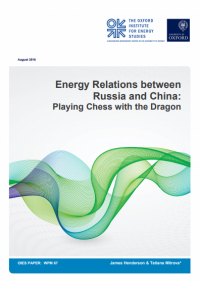Gateway to Think Tanks
| 来源类型 | Publications - External Publications |
| 规范类型 | 其他 |
| Energy Relations between Russia and China: Playing Chess with the Dragon OIES Paper: WPM 67, August 2016 | |
| Tatiana MITROVA; , with James Henderson | |
| 发表日期 | 2016-08-01 |
| 出版年 | 2016 |
| 概述 | Post-sanctions Russia-China energy relations: what expectations? |
| 摘要 |
Energy Relations between Russia and China: Playing Chess with the Dragon OIES Paper: WPM 67, August 2016
Post-sanctions Russia-China energy relations: what expectations?  Russia's relationship with China has a long and complex history, catalysed by the lengthy border between the two countries, the complementarity of their economies and the ambitions of both to be seen as key global geo-political actors. Following periods of tension and friendship in the Soviet era, when the two communist states often struggled to find a mutual understanding, the post-Soviet era has seen a more complicated relationship develop based as much on economic reality as political ideology. Russia's economy has suffered collapse and recovery, often driven by oil price volatility, and has yet to achieve much-craved stability and consistent growth. China, meanwhile, has genuinely become an economic superpower, having enjoyed growth rates in the 7-15% per annum range since the mid-1990s and has now become the second largest economy in the world in terms of nominal GDP. China's rapid economic growth, which has largely been based on industrial expansion, has also seen it become, since 2009, the world's largest energy consumer, with total primary energy demand in 2015 of just over 3 billion tonnes of oil equivalent. The geographical accident that China is also located next to the world's largest owner of fossil fuel reserves means that a commercial relationship based on energy was bound to emerge, and the development of ties between the two countries based on oil, gas and coal trade has generated significant interest and discussion. In particular over the past decade, as Chinese energy imports have increased rapidly while Russia has sought new markets for its key commodities, the issues of inter-dependency, reliance and security have been at the forefront of the debate. This paper aims to contribute to the literature on the Russia-China energy relationship by providing detailed evidence of activity in the post-sanctions period, a comprehensive review of recent negotiations and transactions, and an assessment of the current state of the balance of bargaining power and cooperation between the two countries. This content is available at the Oxford Institute for Energy Studies' website: Energy Relations between Russia and China - Playing Chess with the Dragon |
| 关键词 | Russia' Foreign Policy Russian economy Russian energy policy China Russia |
| URL | https://www.ifri.org/en/publications/publications-ifri/energy-relations-between-russia-and-china-playing-chess-dragon |
| 来源智库 | French Institute of International Relations (France) |
| 资源类型 | 智库出版物 |
| 条目标识符 | http://119.78.100.153/handle/2XGU8XDN/416205 |
| 推荐引用方式 GB/T 7714 | Tatiana MITROVA,, with James Henderson. Energy Relations between Russia and China: Playing Chess with the Dragon OIES Paper: WPM 67, August 2016. 2016. |
| 条目包含的文件 | ||||||
| 文件名称/大小 | 资源类型 | 版本类型 | 开放类型 | 使用许可 | ||
| couv_mitrova_oies_ao(60KB) | 智库出版物 | 限制开放 | CC BY-NC-SA |  浏览 | ||
除非特别说明,本系统中所有内容都受版权保护,并保留所有权利。